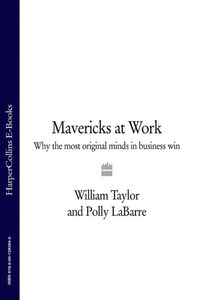INTRODUCTION
The Maverick Promise
PART ONE
RETHINKING COMPETITION
Chapter 1
Not Just a Company, a Cause: Strategy as Advocacy
What ideas is your company fighting for? • Can you play competitive hardball by throwing your rivals a strategic curveball? • Changing the channel: The one-of-a-kind network that transformed television.
Chapter 2
Competition and Its Consequences: Disruptors, Diplomats, and a New Way to Talk About Business
Can you be provocative without provoking a backlash? • Why strategicinnovators develop their own vocabulary of competition. • Winning on purpose:The values-driven ad agency that carves its beliefs into the floor.
Chapter 3
Maverick Messages (I): Sizing Up Your Strategy
Why “me-too” won’t do: Make-or-break questions about how you and yourorganization compete.
PART TWO
REINVENTING INNOVATION
Chapter 4
Ideas Unlimited: Why Nobody Is as Smart as Everybody
How to persuade brilliant people to work with you, even if theydon't work for you. • Why grassroots collaboration requires head-to-head competition.• Eureka! How one open-minded leader inspired the ultimate Internetgold rush.
Chapter 5
Innovation, Inc.: Open Source Gets Down to Business
Have you mastered the art of the open-source deal? • Why smart leaders“walk in stupid every day.” • Bottom-up brainpower: How a 170-year-oldcorporate giant created a new model of creativity.
Chapter 6
Maverick Messages (II): Open-Minding Your Business
Shared minds: The design principles of open-source leadership.
PART THREE
RECONNECTING WITH CUSTOMERS
Chapter 7
From Selling Value to Sharing Values: Overcoming the Age of Overload
If your products are so good, why are your customers so unhappy? • Howto build a cult brand in a dead business. • “Our customer is our category”—the retailer that sells a sense of identity.
Chapter 8
Small Gestures, Big Signals: Outstanding Strategies to Stand Out from the Crowd
Do you sell where your customers are—and your competitors aren’t?• Warm and scuzzy: How Howard Stern became the world’s most unlikelyteddy-bear salesman. • Why the company with the smartest customers wins.
Chapter 9
Maverick Messages (III): Building Your Bond with Customers
Brand matters: The new building blocks of cutting-edge marketing.
PART FOUR
REDESIGNING WORK
Chapter 10
The Company You Keep: Business as if People Mattered
Can you attract more than your fair share of the best talent in yourfield? • How to find great people who aren’t looking for you. • Building thecharacter of competition: Why the world’s friendliest airline unleashes the“warrior spirit” in its workforce.
Chapter 11
People and Performance: Stars, Systems, and Workplaces That Work
The first law of leadership: “Stars don’t work for idiots.” • How free agentsbecome team players. • From bureaucracy to adhocracy: The many merits of amessy workplace.
Chapter 12
Maverick Messages (IV): Practicing Your People Skills
Hiring test: Is your design for the workplace as distinctive as your designs onthe marketplace?
APPENDIX
Maverick Material
ENDNOTES
ACKNOWLEDGMENTS
INDEX
COPYRIGHT
ABOUT THE PUBLISHER
Nearly 25 years ago, the beloved and influential historian Daniel J. Boorstin wrote a much-praised book called The Discoverers—A History of Man’s Search to Know His World and Himself. The book is an exhaustive study of the human capacity to challenge conventional wisdom and move forward—in the arts, in the sciences, in technology. As he told the stories of world-shaping advances, Boorstin reminded his readers of “the courage, the rashness, the heroic and imaginative thrusts” of those who seek to break new ground, and of their “battle against the current ‘facts’ and dogmas of the learned.”
Much of Boorstin’s story-telling features the great explorers (Portugal’s Bartolomo Dias and Vasco da Gama, Italy’s Marco Polo and Christoper Columbus) as well as breakthrough tools such as the microscope and the telescope, which provided new windows into the world and transformed how we made sense of it.
But one of Boorstin’s most likeable characters is the little-known Henry Oldenburg, an early hero in the formation of the Royal Society of London. Today, of course, the Royal Society serves as the national academy of science in the United Kingdom, and is an establishment institution of the first order. Nearly 350 years ago, however, at the time of its formation, the Royal Society represented a deep-seated challenge to the British establishment’s bias against innovation, experimentation, and new ideas—a much-needed triumph of curiosity over received wisdom. The Royal Society’s motto, Nullius in Verba (“Take nobody’s word for it; see for yourself”) captured the restless spirit of Oldenburg and his colleagues, whom Boorstin dubs “the defenders of novelty.”
That restless spirit is what animates the great modern adventure of innovation and entrepreneurship. There is nothing more powerful in business today than a genuinely new idea, and the sense of experimentation that goes along with turning a new idea into a marketplace reality. In an era of hyper-competition and non-stop change, the only sustainable form of market leadership is thought leadership.








